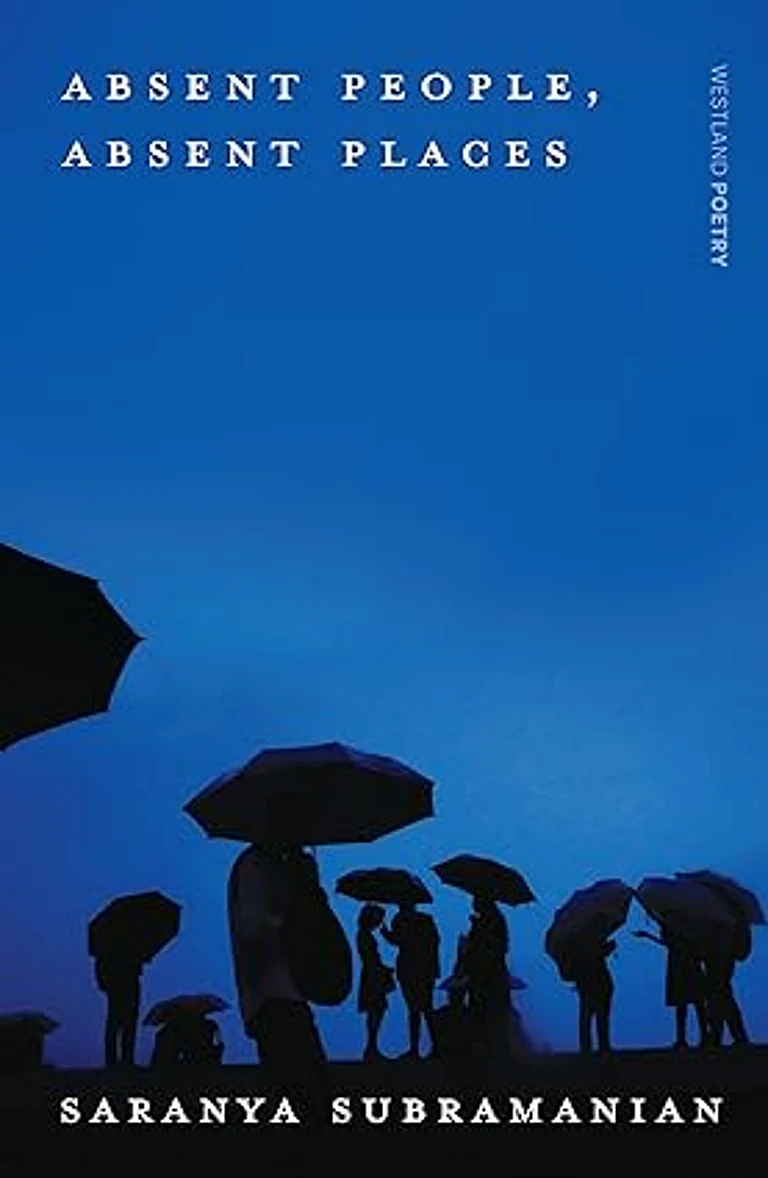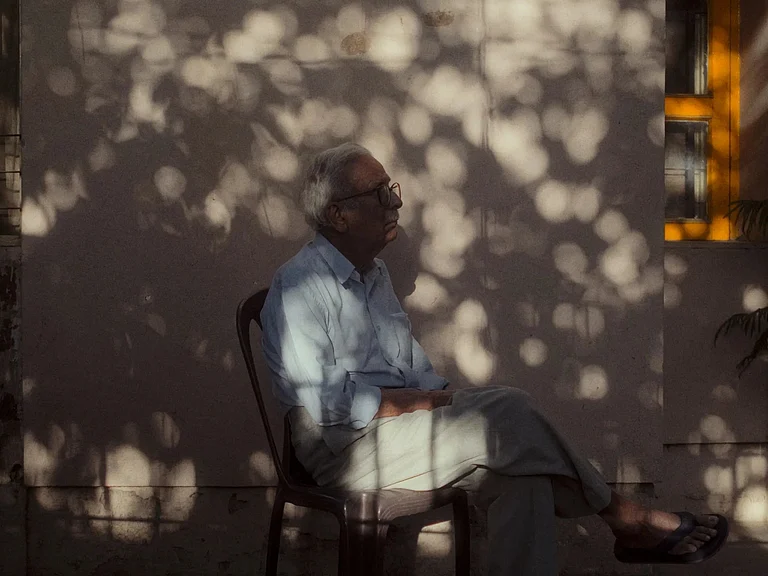All We Have
By Sarabjeet Garcha
Chair Poetry Books: Kolkata
2023
Rs 499
All we have. Three words. A fragment from Samuel Beckett’s cryptic “Words are all we have” – a darkish meditation that provides also the first of the three epigraphs the poet has elected to stand as guards (and ushers) to his book.
A fragment can evoke a wholeness a sentence may not be able to. It can function as an active, live metaphor for the playfulness, the inexhaustible promise and the felt yet indeterminable wholeness of poetry. After all, a book of poems, if it is a book of poems, is a constellation of worlds, just as a poet, when he is a poet, is a community of solitary souls with the intimacy of distant planets.
Poems are difficult stock. They leap over fences and frolic all over the place. The reader soon learns he cannot shepherd them back in, that they can be penned perhaps only in the wander of an excursive essay.
This book of poems is an inner drama in five acts. The first act opens with “Neat”, a poem that is an invocation but also a foreglimpse – in its spiralling staircase architecture unfurling downward to touch the base – of the book’s labyrinthine theme of inner work. But unlike in Rilke, the theme is actualised obliquely here. When you have read the book to the last poem, you realise that the first poem was a prelude as well. That it was an initiatory incantation too, its shape mimicking the poet gathering himself into a line that aims to become a point. You realise that it enacted a process of preparatory cleansing, of neatening, so the journey – which inner work is – could begin.
I thought of Kafka’s inscrutable doorkeeper, but soon knew that I was drifting. Wasn’t the next poem, “Arc”, opening on to light? It broods over grace as an accumulation of non-happenings hatching a seed-light. Kafka’s world is pervaded by a numinous murk, the Holy sensed in its very absence. The murk hangs heavy and oppressive, allowing only as much light as is barely necessary to see the darkness. In Sarabjeet Garcha’s book, the holy is light and bracing, a transmundane – at once transcendent and mundane – luminescence. The journey is slow-footed, and each step disburdens you of the opacity that clung to your sight and made you weary. You don’t leave the world behind; the world meets you anew, dimensions added, not substituted. The world is not passed over, it is not transcended: it is augmented, found.
The third poem steps, by way of myth redux, into a world of moral conundrums processed through irony. The next enacts the choice its title, “Exi(s)t”, scripts. The choice is displaced from the self on to time. The displacement ravels the self: exiting is the way to existing. Is it stoic philosophy making appearance as imagination at the limits? Is this philosophy internalising the menace of poetry that Plato sensed?
Garcha is not the kind of poet who would court the limit experience as a bait for the muse. But neither does he shun the experience that ruins the petrified notions of reality in which we find snug shelter. So with the following poem, “Light”, you exit to another terrain, as it were, where to exist is to feel mystery’s finger tapping your shoulder. Borges-like, you wonder if reality is just another dream. Your moral horizons, as a sentient being, slide farther. The familiar can be mysterious, you learn. The elusively titled “Almost” disarrays the familiar to bare its unending strangeness:
When all sounds die
the night goes back
to the beginning of life
It’s been trying
to finish its lexicon
ever since
“Mine” performs a reversion to seed-form. The reversion is traced orthographically down the poem’s body, leaving a residue of only a y. A primordial duality tailing off like a comet, the penultimate letter of the alphabet gesturing towards descent, beyond which lurks z – the site of the dissolution of beginnings and endings. Cosmic dissolution that gleams as an intimation of pralaya in “Almost” stands now at another threshold.
As if z turns round, the self in cosmos poised on the edge of poesis, which “Neat” ushered in, now becomes poesis as cosmos. In “Iteration” the numinous acquires the tactility of the sensuous, and distant scales meet. The bristling introspective plunge of “Neat” has arrived at a lucidity that gives succour, and the poem holds the reader’s hand. You are ready, with “Crossover”, for terror as the other face of beauty and for the sublime as the affinity of beauty for terror. The poem looks forward to “Homecoming”, the last of the first act, in which metamorphosis, under Ovid’s shadow, resolves the enigma of beginnings and endings.
“Signs” unpicks the moral code of the mysterious being known as the poet. A sage and a child, open and humble, trusting and far-gazing, he knows in the marrow of his soul that there are other worlds, that this world is more than what habit makes it seem. “Screen”, the poem that follows “Signs”, looks in through this window and finds that poems are dreams that words see. And poets? They must be visitants to those dreams. But what are words? To those whose hearing is attuned, they are secret passageways to endless astonishment. Their incalculable worth is disclosed in “Basis”: an incident becomes an event, a world gushes forth from a word. You witness poetry becoming event.
In the second act of the book, love blossoms in a shadow-speckled spring. Love craves companionship, be it of light or shade or sorrow. Radha and Krishna’s amorous play is bathed in the breath of the Bodhi tree in “Blink”. But sorrow – the condition we wake up to, if we ever wake up – is calling. You realise you are only “a mud-plastered house for meteors afraid of dying”. The human being, civilisation, cosmos all meet in an image of dazzling evanescence that lacerates the imagination and stabs the soul. The world as metamorphosis, as a turning z, as samsara chakra is glimpsed in “some swaddle” of the poem “Handkerchief” which dances lightly in love through paradoxes of magnitude. The hinted circularity of death and birth, a misty signature of their oneness, returns again in “Thrift”: in the moon, the rings, the sixteen annas like the moon’s sixteen phases, in the night that swaddles the moon’s ripening and dropping. Put your ear to the poem’s ground. You will catch an ancient hum. Tantra is breathing.
Love’s bizarre ordinariness catches you abruptly in “Tea Company”, a gently piercing love song. As if touched by the wind’s breath, you experience a fragile immortality as you rediscover yourself as perpetual metamorphosis. “A Mouthful” is a mouthful of bareness, of pure, naked love, love pared down to only itself. In “Arrival”, it will be swaddled in darkness. In “Lantern”, the soul-mate and the guru will pass into each other and companionship find itself in seclusion. The lover is a recluse, yet a lover. Pure, incompanionate. “Source” advances, backwards, to the primordial destinies of companionship:
it’s you
from the same cave
we made the same cave
that made us
“Brink-driven” is a spiritual testimonial to a vagabond’s “longing for the lightness the breeze is” – a contemporary and timeless freedom song. In Garcha’s wordcraft – I cannot use the word ‘coinage’ for inventions that bestow unprofitable bounty – a metaphor is the shortest route to a truth; it is poetic intuition’s leaping, disclosive spark. Readers melt into each other and love is etherealised in “Queen”. The poet is a wisp of ether; lovers’ union, a phantom intercourse in readspace. Reading is lovemaking, dissolution, becoming more, many.
Love is a way of dying, wrote Michael Paterniti. But then there is also a dying that is forlorn, lovelorn. The pandemic brought us face to face with pure, sheer dying. Death without ceremony or solace. In the third act of the book, you get to know death and dying intimately.
Most of the poems in this act are pandemic poems. “Night of the Moon” distils the dread of interminable isolation in an image of dark lucidity. Magic and innominate fear transmute childlike innocence in “Spell”: the world remains “saved” in children’s books only while reality becomes sinister, untrustworthy. “Black Compass” is a siege-poem, closing in on the reader like a grave. There is darkness of many shades, and no exit. Escape is fancied in “Not a Thing” by way of a symbolic slide between covid and Ovid, between fading out and metamorphosing. In the poem that follows, a girl of fifteen flares like rage pedalling a cycle, her father riding pillion. She is writing the pandemic necrology and unrolling the roll of shame that memorialises those who “pawned themselves in a game / only the chess master understands.” Garcha’s politics is oblique. It works on sensibility, and never misses. Never minces.
Fears of a sly, overhanging doom guide the poet to patiently regard nature’s mutinous resurgence against a toxic civilisation. Again, poetry becomes the mating of distant scales. The poet happens to forge another sweet new word – “treelight”. A gift whose bestowal will enlarge the reader’s moral compass across distant scales of sensibility. Thoughts of dying, in “Calibrations”, awaken the hope of passing like a leaf that gently releases itself from the tree. A stillness of the order of absolute effortlessness beckons, which will “lay all verbs to rest”.
Like autumn dusk, death has many hues. “Scripture” raises a memorial within the memorial to Mangalesh Dabral (“poet extraordinaire” to whom the book is dedicated). Scripture unveils itself as geology. Creation is the forming of the yet unformed, the making out of what was of what never was. Mourning has passed, been lived through. Spring is rubbing its leaf bud nose on the windowpane.
Childhood comes running in with the first poem of the fourth act, but there is more: “Voodoo” pulls in the whole modern civilisation. Innocent play shivers into heart-rending playacting, touched by the wild hope that childlike magic will salvage a doomed world. The poem restores to witchcraft its long-lost, kind meanings, the meanings the ‘primitive’ Gaia cultures once endowed it with. The incalculable riches of imagination in which a child’s memory is enfolded show in X-ray the intriguing extracurricularity of syllabus in the eponymous poem:
That’s how you ravel
a treasure map, a map leading
to those graffiti-rich desks, those
rink-smooth corridors . . .
A child’s naïveté meets gnawing adult remorse in “Contained”. A delicate twist elevates the small to the monumental, turns the tender into the excruciating. “Safe” gives a new life to a folktale, generations of children have grown up hearing. In memory fired by imagination, reality dissolves into fable. There are intimations of another dimension of experience the reader half-glimpses in “the membrane of daylight”.
That other dimension rises momentarily into full view with “Barter”, a contemporary reprise of the Sakhi, its movement a logic of leaps for the attuned reader to intuit and flow into Tao-like. The holy of the divinely mad poet Hölderlin has arrived. It will have a home to itself in the fifth and final act of the book.
The childlike wonder deepens into a sage’s calm ardour in “Unfailing”. A suggestion invokes Surdas. Acts add up in a cosmic bucket. With “Mountain Mind” you have a poem opening into a kind of play. The play runs on into “Outsilvered” that embraces Native American myth and Tantric lore. The sacred and the enigmatic dance a complicated dance in “Quicksand on the Wall”: the clock crows, not the cock. Reversal happening through the sheer non-act of witnessing. Breathwork as clockwork, turning the trapdoor-dial about, and giving on to illimitable inner space. One looks through time and past it. And lives the moment as eternity. With “Inclination”, the inner and the outer fuse, yet there is no resting forever in lightness and light:
Each puddle carries enough light
to reveal what’s awakened within,
yet something continues to sink.
Another world insists on being acknowledged, but refuses to give you permanent habitation. You must return, and live with a horizon at once interrupted and emancipated by trees. And then, reading “Abundance”, you will contemplate the inscapes of the spirit, with “stillness become the sacred space / where the heart hones its share of grace.”
Deep down where the undercurrent sings, the book is surging towards the holy. Several poems, such as “Barter” and “Unfailing”, have shaped the way to it. “Tailor/Bird” does this by dissolving reality into dream to draw it closer to truth, like Borges does, or like the parable-weaving poet of Yoga Vasishtha did centuries ago. The tailor that is a bird is the grandfather who is a spider that is Providence at work as a tailor bird. Providence is a poet. An Ovid, undeluded by boundaries, a witness with “negative capability”. A Keats from whose emancipated vision certitudes have fallen away.
“The Spendthrift”, an essay poem, loosens the certitudes that spawn delusions of intellectual freedom. Reality returns unbraided, ready to be parsed. The companion essay poem, “One Month”, glides into the holy through mysticism of thought. You breathe in the possibility of “an elsewhere” – where improbabilities become possibilities. “Belongings”, in singing prose, transports you to “unmistakable islands of serenity” – Garcha’s Yeatsian ‘isles of Innisfree'. You sense the presence of a third one walking beside you. You are in The Waste Land. You stand at the gates of the holy. But “Peeto’s Well” sucks you back into the profane. Myth, folklore and history glow under a faint political flame, asking you to see better. Somewhere in the shadows, Sita’s figure beckons, illuminating everything, darkening everything.
The holy will burst forth in the fifth and final act. “Lamp” is a yarn of inner work, harking back to “Neat”, the first poem of first act, the poem about asana siddhi, about sitting and settling into a stable upright posture, the prelude to inner work for becoming – as the shortest distance between two points – the straight line that aspires to be a point. Enacting alaukika, the other-worldly as the restoral of the world’s strangeness, “Lamp” resists prosing. Two civilisations swim in a dusky image of scholars reading “by the reflected radiance / of snow”. There are intimations of “something unnameable” waiting to be known intimately. “Unending” is a parable with a kernel of psychological truth: that poesis is the alchemical art of getting the implausible to affirm an unquestionable truth. You walk into a room “built with eyes closed”.
Baba Nanak’s famed itinerancy inspires “Mirage”, a poem of sheer essentials with meaning unfurling like petals in which “each moment is a mirror to vanish into”. You too become a journeyer of light, you too
. . . set out on a day when nothing
could be taken away from you.
Parables become passages to truth again in “Stopover” and “Phulka”. The first transmutes into poetry millennia of India’s philosophical heritage as Baba Nanak asks Mardana to wake from countless lives of slumber:
Dream time’s over. Arise.
With immense power yet softly, “Phulka” evokes Baba Nanak’s spiritual stature in a parable in which truth flashes in a poetic miracle – a testimony to imagination as the fruit of senses cleansed and awakened.
Sight, vision, insight, intuition, reflection, the mirror of consciousness and its lamp yield – in three consecutive poems: “Return”, “View”, “Mirage” – a rich gleaning of evolving, echoing signification. Here is the poetic sign as a metamorphosis. In “Return”, sight regards reality as uncannily spiritual. “View” at once crumples and stretches space. “Mirage” penetrates illusion to reach what Browning called “instant made eternity”. With “Chakravyuha”, the poet, before bowing out, momentarily turns, as if for the plain fun of it, to form as a mind game. Kneaded into it the game has both riddle and mystery, design and void. What follows is cosmic dreamwork of “Again”, the two becoming each other. And “First Light” grazes the limits of form to drive – no, draw – a homely truth home: it is parable as poetry as reportage.
The book ends with the enigmatically titled “Continuance”. Mirroring the first poem – the initiatory, determined, lance-like “Neat” – in a kind of reversal it refuses the craving to conclude. Two paradoxes, placed like bookends – those empty-eyed doorkeepers – face the abyss the other is to each. Transience becomes a window on eternity. What passes remains forever, what remains is forever passing. Metamorphosis as a bubble forever bursting. The soapy rainbow surface of Plato’s cave turned inside out. Riddles gravitate into mysteries. Mysteries have the odour of truths intuited:
The heart of the house still flowers
in a roominess that has outlived
the walls we called our, each
gone brick thriving on presences,
prim in their vanishings . . .
This is exact yet roomy poetry, elusive but palpable. A world glimmers here like an atmosphere. The mind brushes against mystery and feels the warm aftermath of the rub. When poetry is no more a flight from thinking but the pursuit of thinking to its limits, it wafts into intuition. Sarabjeet Garcha doesn’t balk at the rim of the abyss, he isn’t blinded by the halo. That’s why, I think, every poem in this book has poetry.
Rajesh Sharma is a Professor in the Department of English, Punjabi University





















